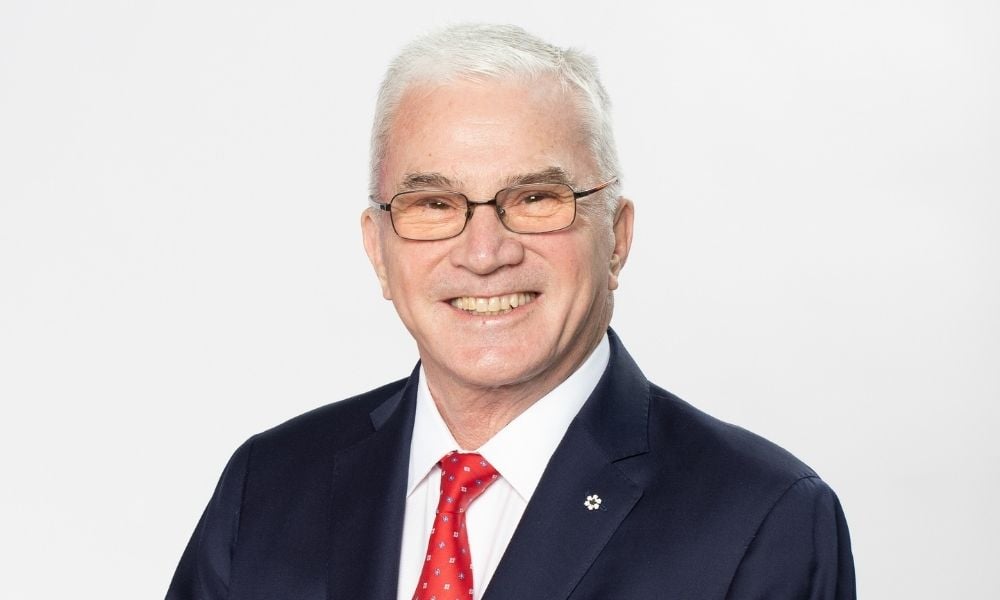Lifetime Achievement award winner reflects on overcoming initial fear and why 'everybody's in sales'

Thomas Caldwell, founder and chairman of Caldwell Securities, has received a few special awards, including the Order of Canada. So, when asked what winning The Harbourfront Wealth Management Award for Lifetime Achievement in the Financial Planning Industry meant for him, he chuckled first.
“It’s kind of funny,” he told Wealth Professional. “I think it’s the Catholic in me because I always feel like they’re making a mistake. The thing is when I get something, my mind clicks to all the people I’ve known over all the years whom I think were better than me.
“I appreciate it. I think it’s great, and I’m grateful for it. It’s not that I feel unworthy. It’s just that I think of all the other great people I’ve known over the years in the business who were really stand-up people and truly outstanding in our business or in doing philanthropic work. I’ve known so many people like that who’ve done more than me.
“I mean I do my best. I come in. I put my head down. I work one day at a time, and try to help people. I try to help younger people. That’s one of the things I really feel strongly about. But, now, I’m getting ready to pop off one of these days, so I like to be able to just give them a phrase that might help them later on in their careers or in their lives.”
Caldwell, now 78, cherishes his intern program, where he tries to teach the next generation to quell their emotions while sticking to the rules and doing the right thing, so things will work out. He also likes to teach the younger people about sales since they’re not taught it elsewhere.
“It’s the most important thing in the world,” said Caldwell. “If you don’t have sales, you don’t have a company. Sales is about communicating an idea of interest to people. Everybody’s in sales.”
He didn’t have connections when he began, but he had a wife, two kids, a dog, and “umpteen mortgages”, he said “and the buck stopped with me, so I had to overcome my fear. So, I really try to help people in sales because I think that’s the most critical function in the free enterprise society.”
Looking back, he remembered being an extremely shy introvert when he started. His dad died when Caldwell was 13, so he didn’t come from money and didn’t know how the business worked or have any of the necessary connections in it. So, he considered his first great accomplishment was getting a job in the investment industry. But, he’d worked in a brokerage office and really wanted to do this mentally challenging work that catered to his wide spectrum of interests.
It took him two years of knocking on doors before someone he’d just met recommended him to Royal Securities. He started working in the cage, then progressed through the back office to the trading desk, bond trading, equity trading, sales, and even underwriting. He stayed there, which became Merrill Lynch, until 1974, when he moved to another firm that merged with Burns Fry.
Caldwell stayed until January 1981, when he started his own firm with one assistant. He’d often sleep in the office for days while doing everything – research, sales, trading, accounting, and the regulatory filing. His business eventually owned 37 exchanges around the world and 48 seats on the New York Stock Exchange. He enjoyed some of the characters in the business and helping people.
“You get a chance to make a difference and be a valued part of your clients’ financial team or their family,” he said. “So, if you want to retire at 55, you’re in the wrong job because I enjoy what I do. I generally enjoy the people I work with. It’s always a challenge and you have an opportunity to help people in a financial way. It’s very satisfying.”
Looking ahead, Caldwell is concerned about how over-regulated the business now is.
“We’ve gone beyond protecting investors to bubble wrapping,” he said. “What tends to happen is it actually creates greater risk for investors because the average advisor doesn’t want to take on small clients anymore. They’re too much trouble and they’re too dangerous. They end up doing it themselves, which is even worse.”
He's critical of too many reforms in too short a time, continuing education being taught by people who’ve never bought or sold a security, and the “insane” paperwork that’s driving a lot of older investment advisors out of the business.
“What you’re left with is basically product movers at major institutions. Now, there’s nothing wrong with mobilizing capital and allocating it to productive products, but people are being deprived of people like me, who really care about their clients or take the time to find out their needs,” he said. “So, people think they’re getting service, but they’re not, and that, I believe, is a direct result of the regulatory framework. I’m not against regulation. We need that, but it’s got to be simplified, realistic, and relevant. That’s the storm cloud I see.”
He still considers it a wonderful business, where people can do well and make great life-long friends.
“It’s a great business to be in. I’m biased because I generally like what I do,” said Caldwell. “I’ve been at it now full-time for 57 years, and I have no plans to retire. I plan to be doing it for awhile yet.”



